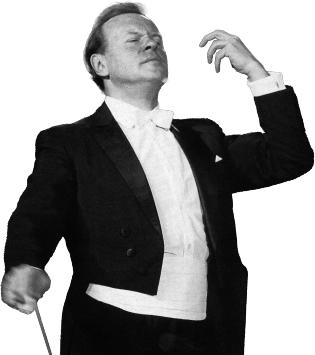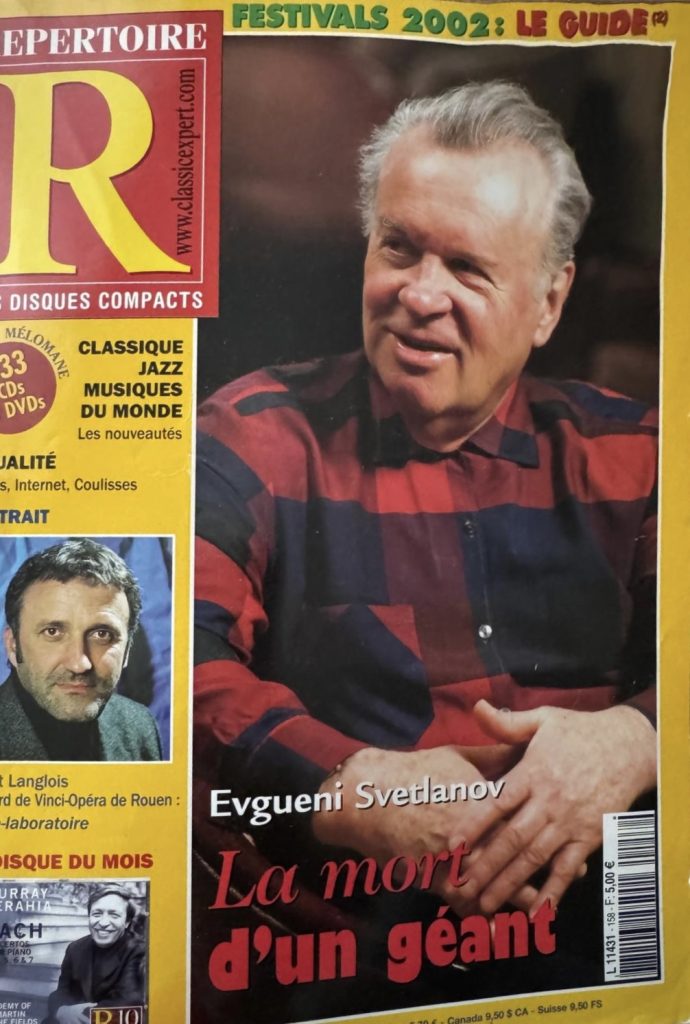Répertoire n°158, June 2002
Repertoire: Your concert and recording experience is immense, and yet there is little talk of you specializing only in Russian music. How do you explain this paradox?
Evgeny Svetlanov: I have certainly devoted my whole life to Russian music, but that does not exclude others. I wanted to mark an important milestone in history, for example, by creating an anthology of Russian symphonic music, including ballets and symphonic fragments from operas. It took me at least twenty years. This anthology begins with Glinka and ends with Myaskovsky, whose complete works I recorded. It touches also on Shostakovich and Prokofiev, whom I record and conduct only in part. Unfortunately, I have not encountered such a coherent guiding logic among my fellow interpreters. Some do have that sense of rigor which drives them to defend the music of their country. Neumann, for example, who recorded almost the entire Czech repertoire. But that is exceptional. Most musicians put their ego first, and thus tend to disperse themselves.
So, no particular calling to promote contemporary music?
Under that term, one can include extremely different styles: Bartók, Britten, Villa-Lobos… I am not opposed to contemporary music — on the contrary — but I dislike what is built artificially. I remain attached to authenticity in creative work. To put it simply: I have always rejected what I perceive as a fraud.
And what about your own works — how do you situate them?
My musical output follows in the continuity of the great tradition. Each musician, by virtue of his personality, is unique. But that does not mean he has the possibility or the duty to invent a new aesthetic every day. To undermine tradition in the name of modernity is absurd. I claim kinship with the greatest masters, whom I consider my companions on the road. In my personal pantheon I place Tchaikovsky, Rachmaninov, Scriabin — but also Mahler, who was not Russian. In studying his works I felt a brother-in-arms; I recognized him at once, from the very first note.
Do you feel yourself a custodian of a specific tradition, to be transmitted beyond Russia’s borders?
Absolutely. When I conduct abroad, most orchestras have a stereotypical sound. But if, for a week, I have the chance to work in depth with an ensemble — in Paris, in London, or elsewhere — then I can transmit what I consider to be the essence of the Russian sound. Russian orchestras have a special quality: they sing. That is why the greatest opera orchestras are particularly expressive.
You use a particular orchestral seating arrangement?
It is called “the French arrangement.” The Leningrad Orchestra never fully adopted it. The USSR Symphony had kept it until the 1960s. I value it greatly because it allows a balance of timbres and a transparency that are essential to me.
Which figures contributed to shaping your artistic conscience?
Among my guiding figures, Golovanov — I was not his student, but I listened to him religiously. And of course my teacher Alexander Gauk, not forgetting Myaskovsky.
You seem to have a particular affection for the French repertoire…
I have a deep love for French music, which I have conducted in many countries. I recorded Debussy, Ravel, Bizet, Berlioz. I also performed much of Dukas, Magnard, Ropartz, and especially Roussel.
What role does recording play for you?
I began with the complete Tchaikovsky, then Brahms, Beethoven, Schumann, Dvořák. With the USSR Symphony I recorded Scriabin, Prokofiev, Rachmaninov. With the Philharmonia of London I conducted the great classics. Recording is a memory — but it is not life. Life is the concert.
What quality do you value most in your students?
Sincerity and kindness.
And what do you do when you are not making music?
I love fishing. That is my sport and my true intellectual release.


